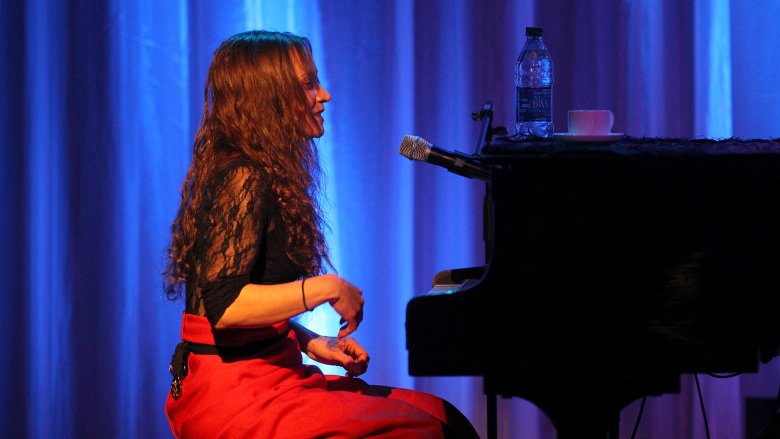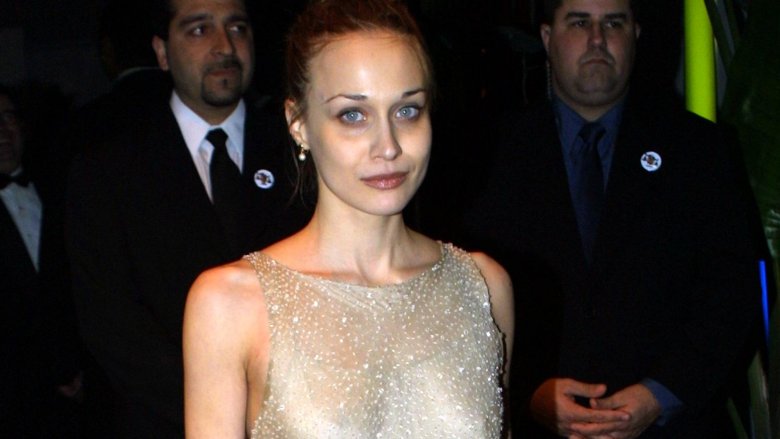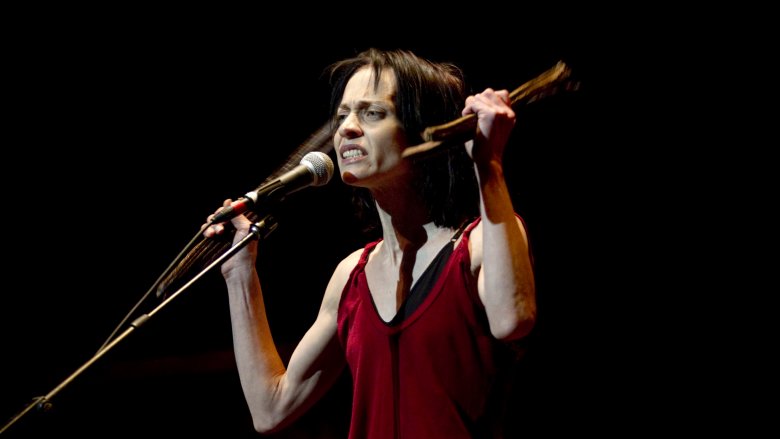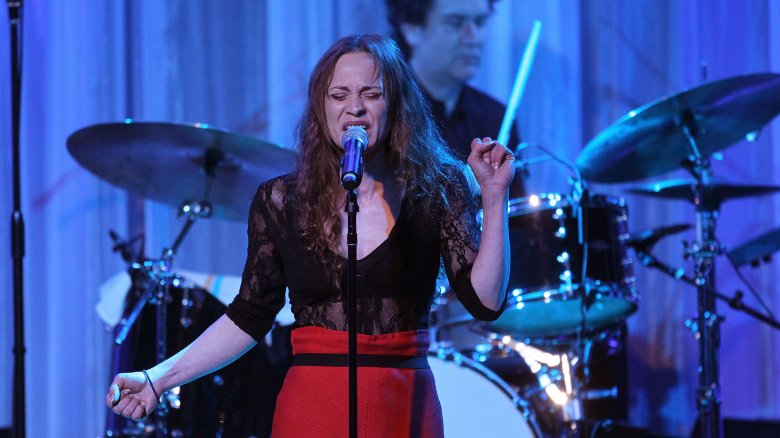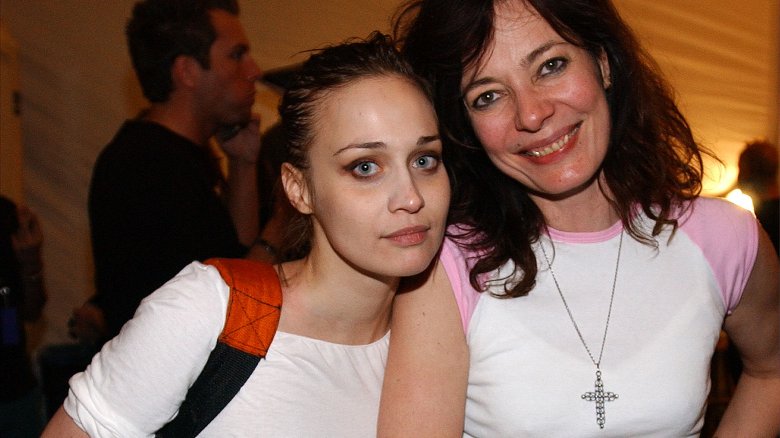Fiona Apple's Tragic Real-Life Story
Describing famous strangers is fraught with pitfalls because countless falsehoods, half-truths, and poorly formed opinions about them abound. When trying to describe Fiona Apple –- a famously strange singer people have often mocked for being different –- there's a huge risk of discussing her in hurtful ways. People are complex, and distilling them down is difficult.
Perhaps the best description of Fiona Apple is "a rare weather event." Her lulling-yet-electrifying voice strikes emotional chords like languid lightning. Her 1996 debut album Tidal was a monsoon of sound that rained eloquence like a poet's thought cloud. Her breakout single "Criminal" blew listeners away like a gale-force wind. When Tidal took the music world by storm, it felt like nature gained a fifth season.
In reality, it was a winter of discontent. Apple publicly sparred with stardom while grappling with a traumatic past. Offbeat onstage outbursts made her a lightning rod. Detractors deemed Fiona Apple a natural disaster and showered her with insensitive insults and criticisms even as seasons passed.
Growing pain
Some people grow radically, hitting walls and changing directions as they bounce through life, which Fiona Apple certainly did on her path to making amazing music. The daughter of actor Brian Maggart and former musical performer Diane McAfee, Fiona Apple McAfee-Maggart learned to play the piano at age 8 and began writing songs at age 11, according to the LA Times. But she wasn't scratching a musical itch so much as she was aching to be understood.
Growing up, Apple was often teased for her looks. She withdrew from her peers and regularly skipped school. Rorschach tests would later suggest she had depression and anti-social behavior. The darkness in her head peaked at age 11. While walking with a classmate, Apple vowed aloud to kill herself and her sister.
Apple started seeing a therapist, which worsened her self-image. She told the LA Times, "I really thought I was fine until they put me into therapy. Then I thought, 'Well, maybe something's wrong with me.' It screwed me up." Her relationship with her parents also suffered, according to the Washington Post. Fiona felt misunderstood, and her parents felt she was manipulative. In an attempt to be heard, she wrote letters and read them to her folks. Her letters evolved into songs, and eventually everyone heard her.
Lost ashore
Much like childhood letters, Apple's songs often said what bled from her life-inflicted wounds. Her debut album Tidal roared with raw emotions that poured from an ocean of misfortunes and misunderstandings. Her most tragic track is arguably "Sullen Girl," which references a trauma-born despair she wanted others to understand.
At age 12 Apple was raped outside her mother's Manhattan apartment. As she recalled, it happened the day before Thanksgiving. She was walking home from school when a man followed her and lurked outside her building after pressing the buzzer to no avail. Apple attempted to evade him by running inside, but he grabbed the door before it closed. He then grabbed her as she was unlocking her own door and threatened her with a weapon. After violating her, he vilely remarked, "Happy Thanksgiving. Next time don't let strangers in."
The incident seared itself into Apple's brain. Fright blighted her dreams. She would stab her bedroom closet with a knife and cry. Feelings of powerlessness later led to an eating disorder that drove her to avoid foods "that looked a certain way" or "were a certain color." This ugliness isn't obvious in the song "Sullen Girl." Rather, Apple wraps her suffering in an elegant allegory: "They don't know I used to sail the deep and tranquil sea / But he washed me 'shore and he took my pearl / And left an empty shell of me."
The Apple of my iconoclasm
In early 1996 a forlorn girl from the Big Apple became the biggest Apple in music. Tidal was awash in praise, and Apple began traveling the world. Her friends may have thought she was living the dream, but she wasn't. Her days became an endless procession of work and sleep, she explained to the LA Times. For many aspiring stars, fame would sweeten that sour situation, but aspects of it left Apple bitter.
Critics scrutinized her looks, and she criticized the scrutiny. Media outlets portrayed the 17-year-old as a taboo temptress. Irked, Apple reflected, "That's how the public sees me, as this pretty little girl, and I'm sure Sony's very happy about that. Because if you're pretty, you're more marketable. But that's wrong. And that's what puts pressure on me more than anything. I hate it. When I was younger and ugly, nobody liked me. Now people like me because I'm pretty? "
Even when she wasn't being ogled, Apple struggled with her looks. While making Tidal, she had an eating disorder and had to undergo therapy. She was determined to purge her body of any bits a sexual predator might try to grab. As a victim of bullying, a rape survivor, and a celebrity, Apple had been objectified. Perhaps that's why she lashed out when she took the stage to be honored during the 1997 MTV Video Music Awards.
Rotten to the press corps
Apple won the MTV Video Music Award for best new artist in a video for her song "Sleep to Dream" in 1997. Rather than bask in the spotlight, she took the shine off her own glory. In her speech, she uttered four words rocked the music world: "This world is "bullsh*t." She urged people to forgo trendiness and "go with themselves."
Apple would later explain on her official website that she "felt like a sellout" who had falsely portrayed herself as "perfect and pretty and rich" in order to play the fame game. Media outlets responded by verbally cutting her to ribbons. MTV News noted that Apple faced rampant ridicule from multiple directions.
NY Rock scathingly described her as "a pretentious and, on occasion, excruciatingly silly human being." In a track on Denis Leary's comedy album Lock 'N Load, Janeane Garofalo unloaded on Apple with a series of biting jibes. Garofalo mocked Apple's eating disorder, derided her as a musician, and made fun of her then-boyfriend David Blaine. Apple, who was a fan of Garofalo, was brought to tears upon hearing it.
Per The Atlantic, websites callously called the singer crazy and would do so for years. It was like a sadistic game of William Tell. People didn't take aim at Apple despite her perceived psychological struggles, but because of them.
Me, myself, and irate
Throughout her career, Apple would suffer the slings and arrows of outraged fortune-seekers. She had rejected the norms of celebrity culture, which made her abnormal in the eyes of many critics. Her unbridled honesty only added to the intensity of the attacks on her. Sometimes Apple has responded with barbed creativity. As the Washington Post observed, the title of her second album -– often referred to as When the Pawn –- is a 90-word rebuttal to a hit piece by a magazine. But she has occasionally lost her composure when feeling stressed by the press and the pressures of celebrity.
One of Apple's most ill-famed incidents occurred during a performance at the Roseland Ballroom in 2000. As the New York Daily News detailed, the singer wanted badly to "put on a good show in New York." But she took issue with the sound system and soon sounded off onstage. Singing became wailing as Apple cursed, cried, and decried critics.
Predictably, reporters treated such low points like a highlight reel. Rolling Stone characterized her ballroom breakdown as a "hissyfit" on a list of her "bad girl moments." In 2013, Women's Wear Daily and other outlets claimed she spewed profanities, acted erratically, and walked out in the middle of a concert in Tokyo after being interrupted by the audience. Apple shot back, telling "the twits who call themselves journalists" that she completed her performance despite being heckled.
The brain in strain thinks mainly on the pain
Some people dismiss Apple's reactions to stress as the eruptions of an emotional volcano. New York Magazine branded her a "world-class drama queen." But perhaps reporters are too busy cherry-picking unflattering information to pick up on potential underlying causes. One fact that often goes unmentioned is that she has battled obsessive-compulsive disorder for years.
Since childhood she's relied on unconventional rituals to stave off anxiety. Rolling Stone reported that in order to feel safe while home alone, Apple "would roller-skate around the dining-room table 88 times, 88 being the number of keys on the piano." In adulthood, various rites would stifle her life and career. In an interview with Elle (via ABC 7), Apple revealed, "At its worst, I was compelled to leave my house at three o'clock in the morning and go out in the alley because I just knew that the paper-towel roll I threw in the recycling bin was uncomfortable, like it was lying the wrong way, and I would be down in the garbage."
Thanks to Apple's OCD, years-long gaps separate her albums and live shows. She doesn't drive, has forsaken most social interactions, and seldom travels anywhere.
I shocked the sheriff
Fame is like a sanctimonious microscope. Every mistake gets blown out of proportion. Take cannabis crime, for example. A Jane Doe getting booked for giving themselves the munchies isn't news. But replace plain Jane with any celebrity, and suddenly a snooze fest becomes the world's most enthralling insomnia. That certainly proved true for Fiona Apple.
In 2012 TMZ reported that police in Texas arrested her. Following in the footsteps of marijuana trailblazers like Snoop Dogg and Willie Nelson, the singer had hashish and pot on a tour bus, earning her a mandatory tour of the Hudspeth County Jail. But Apple didn't back down, actually accusing the cops of being crooks.
Per Pitchfork, Apple addressed her jail stint onstage while singing in Houston. She described most of her captors as "very nice" but singled out four officers of supposedly engaging in "inappropriate and probably illegal" activities which she "encoded" on paper. After claiming those cops made a big deal about her celebrity, she offered to make them famous.
Hudspeth County Sheriff Rusty Fleming issued a belittling retort in which he patronizingly called her "Honey," claimed he was a bigger celebrity, and advised her to "shut up and sing." The Washington Post blasted the incidents, calling them a silly "saga" that shouldn't continue.
Angel's halitosis
Fiona Apple has had her unfair share of hardships. One of the hardest of those ships set sail on the River Styx in 2012. Aboard that boat was Apple's ailing pit bull, Janet. Much like Apple, Janet had been dogged by humanity. The singer recalled in a heartfelt handwritten letter that she first encountered her friend in Echo Park. At the time Janet was just a defenseless 4-month-old. The pit bull had been tied up, chewed up, and used up. She was the go-to target of dogfighters who wanted to "puff up the confidence" of their canines.
They weathered life together from then on. Whether Apple felt despondent or destroyed, she knew could bury her "hysterical, tearful face" into Janet's gentle chest. The pit bull sat in on her songwriting sessions and barked along when Apple recorded music. "Janet has been the most consistent relationship of my adult life," Apple wrote. When Janet turned 14, death intervened.
Janet's gentle chest had developed a tumor. Apple told Pitchfork that when she wasn't with Janet she would pretend her friend already died "so that, when she's actually dead, I can pretend she's in another room." As Janet sickened, Fiona postponed part of a music tour to be with her friend: "I am staying home, and I am listening to her snore and wheeze, and I am reveling in the swampiest, most awful breath that ever emanated from an angel."
A word to the whys
After Janet's passing, Apple immersed herself in music and resumed touring. "I'm just eager to be around people so I don't miss my dog," the singer explained to Pitchfork. Sadly, humans make far crueler companions than canines. In 2013 a female concertgoer shouted a backhanded compliment from the audience: "Fiona, get healthy! We want to see you in 10 years." She wouldn't see Apple for the rest of the show, as the singer had her removed.
As with every other utterance and twitch Apple made, the media reported on her reaction. According to Stereogum, she "unleashed a torrent of vitriol" before banishing her heckler. "I want the house lights on so I watch you leave!" she announced. On her way out, the heckler threw a final haymaker: "I saw you 20 years ago, and you were beautiful." It was a brutal shot that left Apple weeping her next song.
Pitchfork asked Apple why she reacted like she did. She responded, "Am I supposed to stop in the middle of my show and have a conversation with you about what I look like?" Apple also offered an illuminating take on her life in the limelight: "Everything that happens with me gets made out to be a fiasco, but I have every right to do everything I've ever done."
The art wants what it wants
In a way, Fiona Apple seems trapped by her own talent. Discussing her blossoming career in 1996, she admitted to the LA Times, "I never really wanted to do this. It's just the only thing I can do, you know? I write music. You've gotta make a living at something, I guess." Sixteen years later, Apple didn't seem any more enamored with stardom. In 2012, after a seven-year hiatus, she released her fourth album. Pitchfork described The Idler Wheel (whose full title is 23 words long) as Apple's "barest album" and called it "gorgeously uneasy."
Fiona Apple compared The Idler Wheel to poop. Specifically, she called it "the excrement of my life, the excrement I was trying to exorcise out of me." In fact, she acknowledged not listening to other music because she didn't want to alter her sound based on what other artists put out.
Apple's aversion to labels sounds like a cruel irony. She's spent years being pigeonholed and pilloried. Yet despite the derision, she hasn't retreated from the music world. Rather, music is her escape from the world. "I still get very sad and sometimes I feel like I have no friends," the musician mused. "But when that happens now, I'll think of people whose names or faces I don't know. They're my friends and they love me. I've got them. It really does save me."

